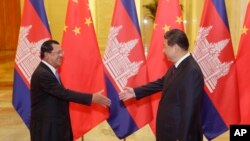Cambodia’s foreign minister on Thursday said Cambodia continued to take a neutral position on foreign affairs despite its increasing closeness with China, which he said was in the country’s interest.
Prak Sokhonn said during a speech in Phnom Penh that Cambodia was “not with any superpower” but that it had “friends and they love to help us.”
“Cambodia thinks about its interests. For instance, what are the benefits of relations between Cambodia and China? If there are benefits, what are they? The answer is there are many,” he added.
On the issues of the South China Sea and North Korea, Cambodia has been accused of backing China.
Sokhonn denied that Cambodia had backed China over the South China Sea in violation of ASEAN's non-interference policy.
China’s embassy in Cambodia describes the bilateral relationship as one between “good neighbors, good brothers, good friends and good partners.”
Trade between China and Cambodia rose to $4.8 billion last year, up by about $200 million compared with 2015.
Prime Minister Hun Sen in April told visiting officials from China that Cambodia would continue to support the One China Policy. China has recently issued public support for Cambodia’s crackdown on dissent and allegations of a conspiracy to topple the government backed by Washington. Geng Shuang, China’s foreign affairs spokesman, told reporters in Beijing that China “supports the Cambodian government’s efforts to protect national security and stability.”
A few days later, Wang Jiarui, vice chairman of the National Committee of the Chinese People's Political Consultative Conference, met with Heng Samrin, National Assembly president, and Senate President Say Chhum, officially “offering support” to Hun Sen over the decision to charge Cambodia National Rescue Party President Kem Sokha with espionage.
Kao Kim Huon, minister attached to the prime minister’s office, said Cambodia had appointed a “research team” to work with their Chinese counterparts to “understand more about the color revolution.”
The arrest of Kem Sokha, NGOs and media closure drew criticism from the United States, European Union, United Nations, United Kingdom, Germany and Australia, drawing a rebuke from Prak Sokhonn, a foreign minister, who scolded the western governments for “interfering” in Cambodian politics.
Chheang Vannarith, chairman of the Cambodian Institute for Strategic Studies, said China was “taking advantage” of the political crisis in Cambodia.
China “wants to pull Cambodia to be far away from the west. The farther, the better,” he added. “Thus China can strengthen its leverage in Cambodia and also in the region as well.”
“So if Cambodia is not very careful, we could fall into the trap of the game of superpower countries.”







